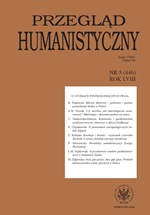Swoi, gdy polscy. Inni, gdy głusi. Praktyki kolonizatorskie wobec głuchych w polsce
Part of us if Polish. Different if Deaf. Colonizing Practices towards the Deaf in Poland
Author(s): Monika ZajkowskaSubject(s): Cultural history
Published by: Wydawnictwa Uniwersytetu Warszawskiego
Keywords: audyzm; dyskryminacja; głuchy; Inny; język migowy; kultura Głuchych; kolonizacja kultur; medykalizacja; mniejszość kulturowa; oralizm; system językowo-migowy
Summary/Abstract: The article is an attempt to synthesize discriminatory practices against the deaf. Deaf people and their culture are subject to colonizing practices by hearing people. A sign language is considered a worse form of communication. Little public information is translated into a sign language. From an early age deaf children undergo rehabilitation to learn speechreading and lipreading (e.g. using cued speech), or the use of indirect methods between a natural sign language and Polish language, i.e. the signed Polish is forced. A complete ban on the use of sign language is often suggested to make the rehabilitation process more effective. The knowledge concerning deaf education or logopedics for the hearing impaired people often constructs and maintains the unfair image of the deaf. The medical discourse focuses on disability and frailty of the deaf. All this creates a negative image of a deaf person, who becomes a stranger in the oral culture. There is a strong pressure to make the deaf adapt and start “to hear”. These actions are an attempt to acculturate the culture of the deaf.
Journal: Przegląd Humanistyczny
- Issue Year: 446/2014
- Issue No: 05
- Page Range: 97-105
- Page Count: 9
- Language: Polish
- Content File-PDF

